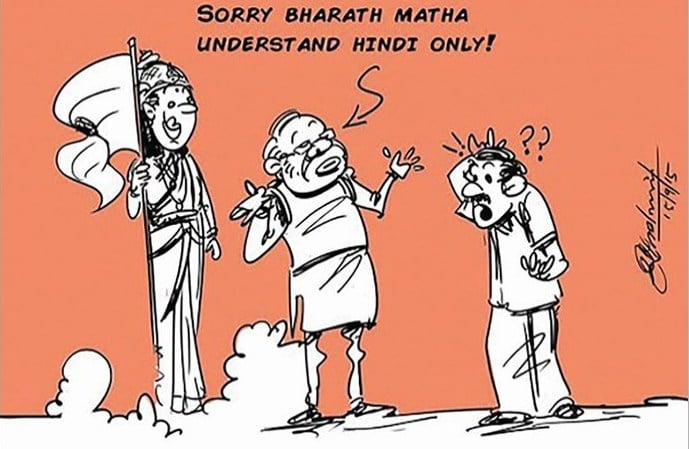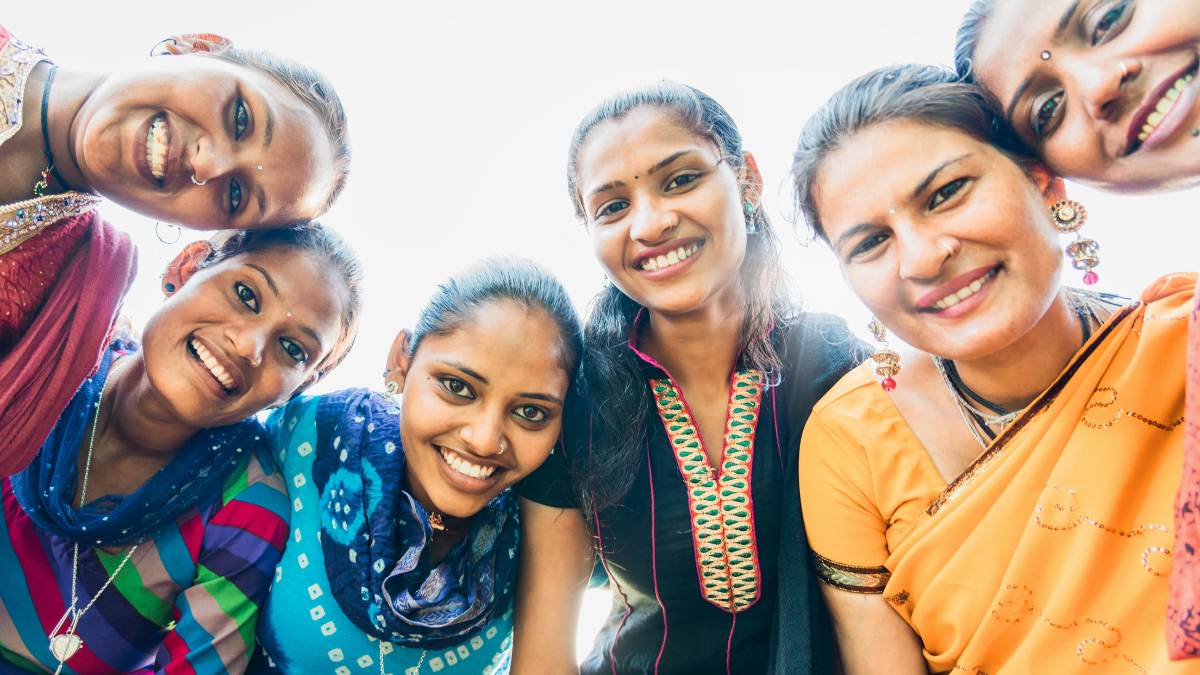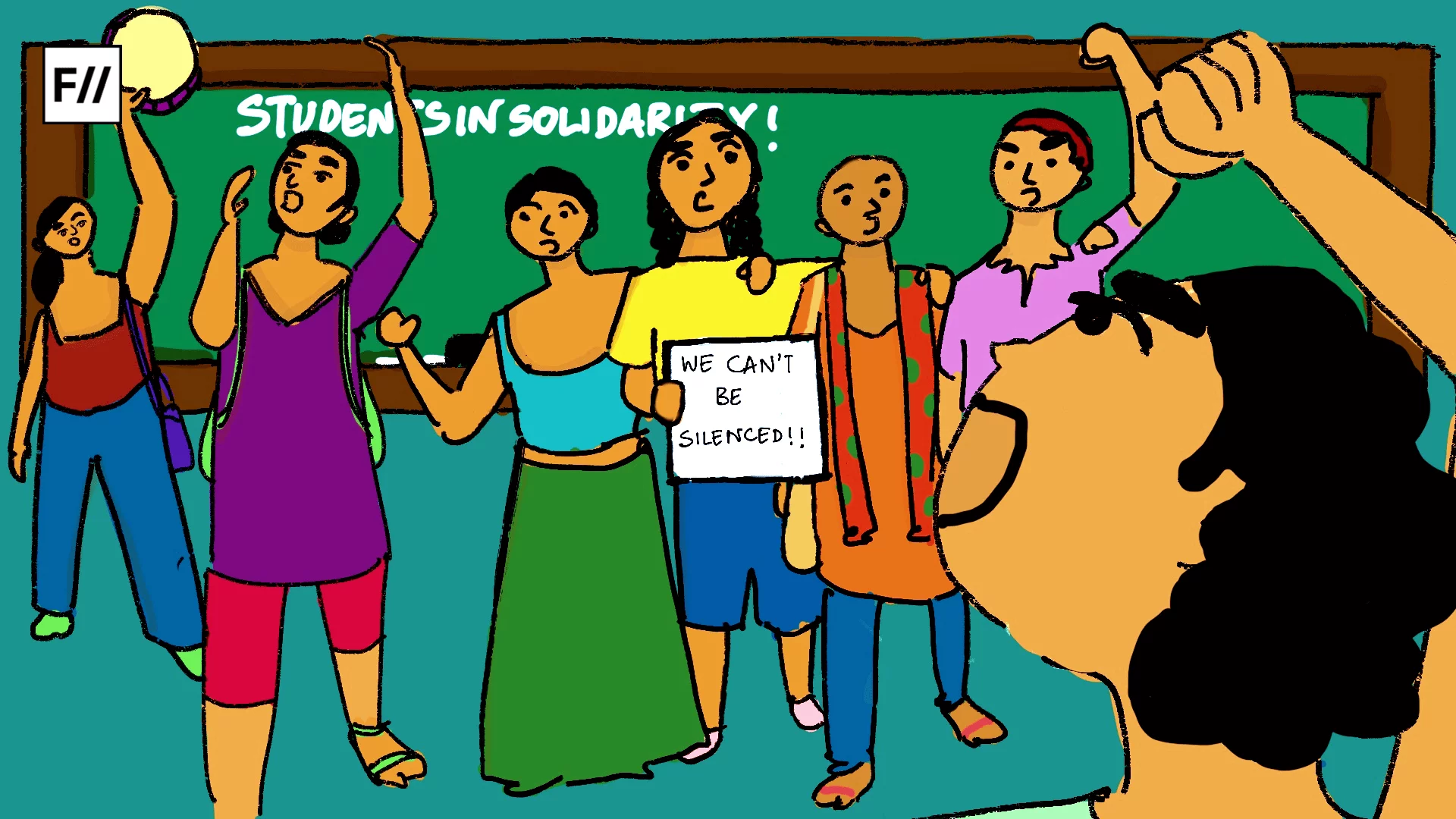Being part of an elite higher education institution where people from almost every part of the country mingle has made me more aware of my own identity. The next step in the process of understanding and grappling with multiple aspects of my identity including religion, sexuality, region, and gender was also coming to terms with this idea of privilege. Privilege as I understood was multifaceted and depended on the whole corpus of your experiences, entitlements, and bereavements.
One facet of such privilege that I never before noticed was that of language. A person’s ability to speak a certain language can also determine his or her position in the spectrum of privilege, especially in a country like India. Many students who came from different parts of South India, including me, were expected to know Hindi or learn Hindi once we began college. The medium of instruction was English and almost everyone was English educated, yet whenever a group of students were having a conversation there would be moments when they would just burst into speech in Hindi and expect everyone to be a part of the conversation.
Now this might come from the fact that Hindi as a language is taught across the country. In most non-Hindi speaking states, the government follows a three language policy whereby Hindi is to be compulsorily taught. However, the quality of Hindi education in most of these areas is deplorable. Students mug up a few lines here and there the night before the exam in order to pass (I still remember binge watching SRK’s movies the night before my Hindi exam to memorise a few dialogues). Moreover, the quality of teaching also suffers as teachers are themselves not native speakers and were educated in an equally deplorable manner.
So the ultimate effect is that most of us gain the ability to read and write the language and perhaps understand some amount of speech, just enough to enjoy a movie. This means that when students who are native speakers of the language suddenly burst into speech in fast fluent Hindi, we are effectively excluded from the conversation.
But this is never addressed. Most people I have spoken to about such exclusion would much rather have me learn the language through more exposure to it than switch to English which in the kind of surroundings I live in, everyone is equally fluent in. While everyone seems quite oblivious to such ubiquity enjoyed by Hindi even in a South Indian metropolis, English speaking has been seen as a kind of privilege. And I do agree to this for two reasons: first, because of its wide usage across the world and the consequent opportunities it opens up and second, because it acts as a common denominator in our country where hundreds of languages are spoken across regions.
A person’s ability to speak a certain language can also determine his or her position in the spectrum of privilege.
Fluency in English is also recognised as a corollary of other forms of privilege which is also something I cannot deny. However, when understanding a person’s language privilege in a country like India, English speaking privilege has to be contextualised.
For many from the North Eastern part of the country, it might just be a mark of their colonial past and not financial or social privilege. And for many others like me from Kerala, it might be a basic requirement since even State government jobs require knowledge of the English language and most of the working population is employed in the service sector where low level jobs as well require proficiency in English.
However these factors generally tend to get ignored as many of my Hindi speaking friends who have actually had better schooling than me tend to measure my privilege or my background merely based on my English speaking skills. The fact that I come from a state where almost everyone who has had access to secondary education speak good English due to the kind of employment opportunities they have access to is completely ignored.
The same might not be true for large portions of the Hindi speaking populace. They have the option of writing several national level tests in their mother tongue while the non-Hindi speaking minority have no option but to take them in English. Hence, when it comes to English language privilege it cannot be understood independently of the region a person is from in India.
Also read: Privilege 101: Your Handy Primer To Oppression And Privilege
The intention behind this rant is to point out two things I’ve noticed/faced as part of the non-Hindi speaking minority: first, Hindi is not the national language. Our country is one with a lot of diversity and we would all be much better off recognising it for what it is, rather than trying to homogenise it; second, just like the case with any sort of minority, Hindi imposition is a very real problem that minority language speakers face. So if you’re a Hindi speaker amongst a group of people, all of whom know English but some do not know Hindi, just be considerate and talk in English.
Our country is one with a lot of diversity and we would all be much better off recognising it for what it is, rather than trying to homogenise it.
My reasons for listing these down are a few personal experiences, two of which I shall recount. I study in a premier educational institution in the country and here, your command over the English language can decide a lot of things, but something it definitely does not expose is your background. Based on my ability to speak English, most people characterise me as an upper class, upper caste individual, someone who has had ‘an easy, privileged life’.
This saddens me as it takes away my identity as a lower middle class, backward caste woman and diminishes all of my experiences based on this identity. My ability to speak English seems to determine my privilege, but for me, the language was a basic skill I picked up knowing that it was the only way for me to connect with the different language groups in this country.
Also read: I’m #SouthIndianAndProud, Are You?
Recently, a campus group I am a part of, organised an event. One of the panellists, a native Telugu speaker, decided to deliver her speech in her mother tongue with an interpreter translating the same to English. Upon this, a person came up to me and asked, “Why can’t she speak in Hindi if she knows that language as well?” This question is the mark of privilege that Hindi speakers, as the majority, enjoy.
The reason of the behind asking this question was that the majority of the audience were native Hindi speakers. Now the problem with this is the fact that Hindi is still a second language for the panellist and her knowledge of the same comes from her need to communicate with the people she works with who may only speak Hindi. She might be able to express her thoughts and experiences with more clarity in her own language. Moreover, not all people who attended the event were native Hindi speakers, including me. So even if she were to speak in Hindi, a translation would still be necessary. And it also runs the risk of her not being able to express herself fully.
every time a South Indian is expected to speak perfect Hindi, it is definitely a sidelining of a minority.
We create a lot of hue and cry over religious and political minorities being pushed to the side. We raise our voices against the imposition of Hindutva. But language and culture are equally important parts of a person’s identity and in the absence of vote banks based on linguistic lines (except perhaps in Tamil Nadu and Karnataka) this is largely ignored. Articles 29 and 30 of the Indian Constitution recognise minorities on the basis of language as well. So every time a South Indian is expected to speak perfect Hindi or a Hindi speech is found acceptable over that of any other language in a diverse gathering, it is definitely a sidelining of a minority.
Therefore, there is no stand-alone English speaking privilege in India. It intersects with every person’s other regional linguistic identity as well. So this intersection is what needs to be understood when analysing language privilege in a country like ours. Without that, it is impossible to see where one stands on the overall privilege spectrum.
Featured Image credit: New Democratic Labour Front
About the author(s)
I am a third year law student at the National Law School of India University, Bangalore. I believe in bringing to the fore the voices of the ignored and the unheard mostly because I grew up and went to school with underprivileged kids although from a middle class family. Whenever I'm not sleeping, eating or overburdened by projects and classes, I'm probably being hated on for being a SJW trying to make people acknowledge their privilege.





Do the Pakistani language i.e. Hindi states of North India follow any 3 language formula. No they follow only single language formula ie, Islamic copied Pakistani language Hindi.
Why is the India language people expected to blabber in Pakistani language but Pakistani language people i.e. Hindians dont need to know India language ???
HIndians are world class hippocrats.s
I really don’t understand what you are trying to say? Are you really insulting a language because of its origin? That’s stupid and xenophobic.
Hindians are stupid that they dont understand they speak in Pakistan’s language and claim to be India people.
THis is the true culture of the Pakistani language people :
http://www.google.co.in/search?q=வடமாநில&client=opera&hs=43B&source=lnms&tbm=isch&sa=X&ved=0ahUKEwjc7uKmwI7gAhXbdysKHf9HBoYQ_AUIDygC&biw=1880&bih=939